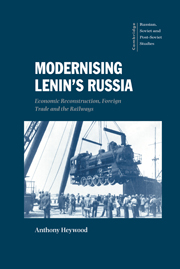Book contents
- Frontmatter
- Contents
- List of illustrations
- List of tables
- Acknowledgements
- Technical note
- List of abbreviations and acronyms
- Introduction
- PART I Towards economic reconstruction, 1917–1920 the birth of the railway imports policy
- PART II Trade and isolation, 1920–1921 implementing the railway imports policy
- 3 Krasin's first results
- 4 Approaches to Britain and Germany
- 5 Second thoughts
- PART III Retreat, 1921–1924
- Conclusion
- Notes
- Bibliography
- Index
- Cambridge Russian, Soviet and Post-Soviet Studies
- Plate Section
5 - Second thoughts
Published online by Cambridge University Press: 14 August 2009
- Frontmatter
- Contents
- List of illustrations
- List of tables
- Acknowledgements
- Technical note
- List of abbreviations and acronyms
- Introduction
- PART I Towards economic reconstruction, 1917–1920 the birth of the railway imports policy
- PART II Trade and isolation, 1920–1921 implementing the railway imports policy
- 3 Krasin's first results
- 4 Approaches to Britain and Germany
- 5 Second thoughts
- PART III Retreat, 1921–1924
- Conclusion
- Notes
- Bibliography
- Index
- Cambridge Russian, Soviet and Post-Soviet Studies
- Plate Section
Summary
In mid-September 1920 Chicherin informed Lomonosov that the national imports policy was under review. The result included Sovnarkom's confirmation, on 5 October, of a revised NKPS programme for 1920 worth 294 million gold rubles. Superficially this decision involved just a minimal reduction of the gold allocation of the previous March. But closer investigation of railway policy, imports planning and the decision-making process reveals that the NKPS was losing its earlier precedence for investment and imports. Second thoughts were emerging about the whole strategy of railway-led reconstruction and especially the NKPS imports programme.
The underlying issue was the deterioration of the economic crisis to the point where it threatened the regime's survival in the winter of 1920–1. Not only did the ‘shock’ tactic of prioritising transport fail to break the circle of decline, but a rapid breakthrough in transport reconstruction seemed less likely and less relevant. Moreover, controversy over Trotskii's leadership of the NKPS put the transport commissariat politically on the defensive. At the same time competition for gold resources intensified as Krasin's achievements in Europe spurred hopes among other commissariats of using imports to solve their own immediate shortages of equipment, fuel and food. Insofar as the issues of reconstruction and modernisation remained live amidst the deepening crisis, the NKPS found itself no longer able to compete when, to Lenin's delight, the GOELRO commission finally delivered its visionary electrification plan in the late autumn.
- Type
- Chapter
- Information
- Modernising Lenin's RussiaEconomic Reconstruction, Foreign Trade and the Railways, pp. 135 - 160Publisher: Cambridge University PressPrint publication year: 1999

